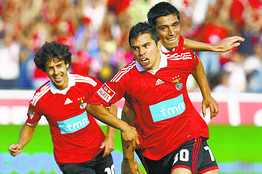SL Benfica centerback Luisão isn't a player who immediately comes to mind when one thinks of Portuguese football, in which panache is prized ahead of pace and power.
Fittingly, for a man whose name literally means "Big Luís," the Brazilian defender's 6-foot-4-inch frame is long and muscular and, while his main responsibility is taking opposing center-forwards out of the game, he has a knack for popping up with important goals.
He did just that this past Saturday, giving Benfica, at the top of the Portuguese League, a 1-0 win over second-place Sporting Braga, which, in all likelihood, will seal the club's record 32nd domestic championship. Benfica boasts a six-point lead with six games to go, and it's hard to see it throwing away the title.
"Benfica is always considered a title challenger, and nothing is decided yet, but I think we have taken an important step toward" the title, Luisão told reporters after the win over Braga. "We are working toward that goal."
You can only imagine what the party will be like when the league crown does return to the club's Estadio do Luz for the first time since 2005. Benfica is far and away the country's best-supported club, and has more than 200,000 fans world-wide who pay around $34 a year for the privilege of calling themselves "socios" or club members.
According to club officials, no team in the world has more paid-up members. And, for a relatively small nation like Portugal, its fan diaspora stretches all over the world. "Casa do Benfica" ("House of Benfica") fan clubs can be found in places as diverse as Johannesburg, South Africa; San Jose, Calif.; Luanda, Angola; and Sydney, Australia.
Yet, Benfica has become something of a byword for underachievement. In the past 15 years, the club has won just one league title, watching helplessly as Porto—its bitter rival from the north of the country —established itself as a force, not just in Portugal, but also in Europe: witness the UEFA Cup and Champions League trophy it won under José Mourinho.
Last summer, Benfica rolled the dice and spent heavily to redress the imbalance. About $45 million was spent, with $7 million recouped in sales. In came, among others, Ramires—at 23 years old already a regular in midfield for Brazil—and Javi Garcia, a promising defensive midfielder from Real Madrid. One of the more interesting signings, however, was Argentine striker Javier Saviola, who rejoined playmaker Pablo Aimar a decade after the pair set South American soccer alight.
Back in the fall of 1999, Mr. Aimar and Mr. Saviola, aged 19 and 17, respectively, at the time, formed a devastating partnership for Argentina's River Plate, whom they led to the Apertura and Clausura championships. Their precocious success led to call-ups to the national team and big-money moves to top European sides. Mr. Aimar joined Valencia in January 2001 for a club-record $32 million and, six months later, Mr. Saviola transferred to Barcelona for $20 million.
Both hit the ground running. Mr. Aimar led Valencia to two Spanish titles and a UEFA Cup, while Mr. Saviola scored 60 goals in his first three seasons at Barcelona.
But then something unusual happened: Their performances dropped off severely.
Mr. Aimar remained at Valencia until 2006, though by the end, he was a shadow of his former self. Having scored eight goals in the 2002-03 season, the playmaker managed just 13 in the next three years amid a succession of injuries.
This was followed by two lackluster seasons at Zaragoza, the second blighted by relegation. Mr. Saviola was loaned out to Monaco and Seville, both times failing to make his mark. After another year as a bit-part player at Barcelona, he was picked up as a free agent by arch-rival Real Madrid, but, again he was a marginal figure, making just six league starts in two seasons.
But in the summer of 2008, Benfica took a gamble on Mr. Aimar and, after an injury-slowed first half of the campaign, he excelled toward the end of the 2008-09 season. So much so that the club decided to repeat the exercise with Mr. Saviola, whom Real Madrid was looking to off-load.
The pair have since enjoyed a renaissance—Mr. Saviola has scored 17 goals, and Mr. Aimar is back to his creative best—and, at 28 and 30 respectively, both have a number of good seasons left in them.
Together with countryman Ángel Di María—arguably Benfica's player of the season and, at 22, a likely target for Europe's top clubs this summer—the Argentinian trio have been the driving force behind Benfica's resurgence.
With the domestic league title all but wrapped up, Benfica can now focus on European competition: On Thursday it takes on Liverpool in the quarterfinals of the Europa League, the new name for the UEFA Cup.
Benfica's legion of fans are once again dreaming, harking back to the early 1960s and the days of Eusebio and Mario Coluna, when the club twice won the European Cup.
—Gabriele Marcotti is the world football columnist for The Times of London and a regular broadcaster for the BBC.






Sem comentários:
Enviar um comentário